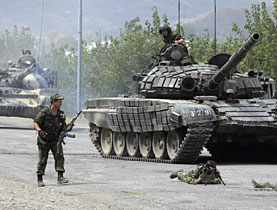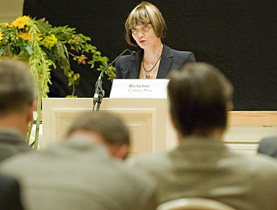Swiss peace efforts come under the spotlight

Switzerland's role as mediator in conflicts has been coming under scrutiny by the international community in the past few weeks.
Twenty years ago the Swisspeace Foundation was launched in a bid to study the causes of conflict and to promote peace through counselling, education and publications.
During the Cold War era the status of neutral Switzerland was recognised on the international stage. But the fall of the Berlin Wall meant a re-definition of the country’s role.
In its capacity Swisspeace played a key role in creating a public awareness of the importance of peace promotion, says Thomas Greminger of the foreign ministry.
“One of the strengths of the foundation is that it offers a platform where civil society – non-governmental organisations and churches – meet to align their positions with the government,” Greminger said.
“Switzerland traditionally played the part of the host, in a wider sense of the word. It provided the venues for negotiations and the signing of treaties,” says Laurent Goetschel, director of Swisspeace.
“With Foreign Minister Micheline Calmy-Rey, however, the country has opted for a more pro-active policy, notably for mediation,” he adds.
Climate change
Goetschel says one of the early success stories was the pioneering role of the foundation in pointing out climate change as a factor in conflict research.
“There are no wars because of the weather, but it can be a contributing factor,” he said.
But does Switzerland still have a role to play on the world “peacekeeping” market where among others Scandinavian countries and France are active?
Calmy-Rey’s call made at the annual ambassadors’ conference seems to be part of the dynamics.
“The only force we have ever had are words,” she said, appealing for discussions with important politicians, even if they are considered controversial.
One thing is clear. “Swiss facilitation and mediation are very much appreciated internationally. At the United Nations our country is held in high esteem, alongside Norway and Ireland,” Greminger said.
“We have some comparative advantages,” adds Goetschel, “like the fact of not having a colonial past and not wanting to be a military power.”
Regions
For Julian Hottinger, a mediation expert and member of the pool of experts of the Swiss foreign ministry, it depends on the region.
“In Africa, it’s certainly an advantage to be able to speak French and be a non-member of the European Union. But elsewhere it can be a disadvantage. That puts us in a position of weakness and if you want to blame a mediator you can take it out on Switzerland, which is small and isolated.”
Is that a reference to the unpleasant aftertaste over the Swiss mediator in Colombia, Jean-Pierre Gontard?
Colombia’s defence minister last month accused the Swiss negotiator of transporting ransom money for a leftwing rebel group – the Revolutionary Armed Forces of Colombia (Farc) – concerning the release of two hostages in 2001.
“It’s not the first time facilitation has been interrupted in Colombia. It’s actually the third,” explains Greminger.
“Mediation always depends on the two sides concerned. And one of them can decide to resort to means which seem more appropriate, as for example direct contact or military means. Our country has no power to influence such a decision. It happens, that’s all.”
And what has happened to the Geneva Initiative on the Israeli-Palestinian conflict, in which Switzerland was heavily involved, and which now seems dead and buried?
“It was very appealing but if one of the parties in the conflict does not wish to be involved, it ends there. Also you have to take account of things and know if you are negotiating with state officials or not,” Goetschel said.
swissinfo, based on an article in French by Isolda Agazzi/InfoSud
Peace promotion is an integral part of Switzerland’s foreign policy. It comes under the political division IV of the Swiss foreign ministry, which deals with “human security”.
The peace policy section concentrates on the following areas: southeast Europe Nepal, Sri Lanka, Indonesia, Angola, the African Great Lakes region, Sudan, Colombia, Guatemala and Mexico.
Its priority issues are: power sharing, how the state is organised, democratisation, reform of the security sector, the holding of elections, coming to terms with the past, the protection and promotion of human rights and international humanitarian law, religion and conflicts, and the fight against anti personnel mines and the proliferation of small arms.
The pool of Swiss experts for the civil promotion of peace includes people who can be deployed rapidly in civil peace missions for a limited time.
Swisspeace was founded in 1988 as the Swiss Peace Foundation with the goal of promoting independent peace research in Switzerland.
The aim of its Center for Peacebuilding (KOFF) is to promote a coherent peace policy between the Swiss authorities, aid agencies, and other non-governmental agencies. It is sponsored by the Swiss foreign ministry and numerous Swiss NGOs.
KOFF has been working on southeastern Europe, the Israeli-Palestinian conflict, Sudan, Sri Lanka, Indonesia, Afghanistan and Guatemala.

In compliance with the JTI standards
More: SWI swissinfo.ch certified by the Journalism Trust Initiative











You can find an overview of ongoing debates with our journalists here . Please join us!
If you want to start a conversation about a topic raised in this article or want to report factual errors, email us at english@swissinfo.ch.